Ceredigion MS Elin Jones told a packed Great Hall ‘we’ve been here before’ when addressing a crowd gathered to protest a downgrading of services at Bronglais Hospital.
She was not the only politician who took to the stage at the event organised by campaign group, Protect Bronglais Services, and vowed to fight against any centralisation of services away from rural west Wales.
Hywel Dda Health Board has launched a consultation into plans to change services, which in part would see Bronglais Hospital’s highly respected stroke unit downgraded to a treat and transfer facility, with patients being sent to Withybush in Haverfordwest or Llanelli.
The concerns raised were not only from the communities of north Ceredigion, Montgomeryshire and Meirionnydd but from further afield, who fear that services are being pooled in more populated areas of the health board in Llanelli and Carmarthen.
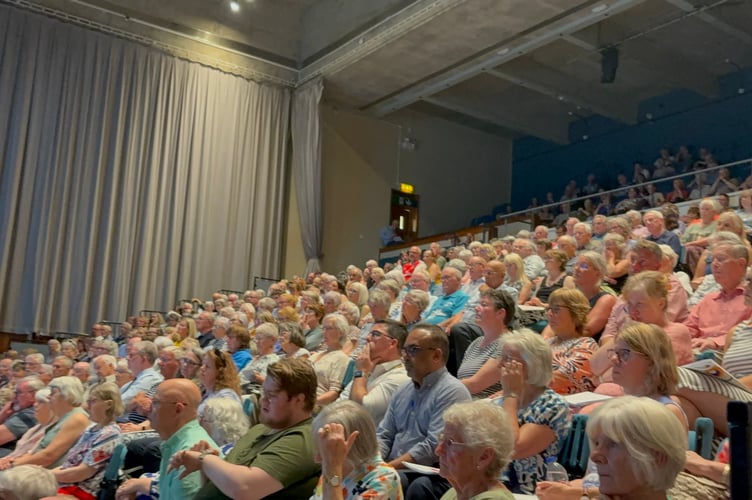
Hywel Dda University Health Board’s Clinical Services Plan focuses on nine healthcare services that are “fragile and in need of change,” it has said, with services, and potential changes at the four main hospitals of Haverfordwest’s Withybush, Carmarthen’s Glangwili, Llanelli’s Prince Philip and Aberystwyth’s Bronglais, which include - critical care, emergency general surgery, stroke, endoscopy, radiology, dermatology, ophthalmology, orthopaedics, and urology.
In the case of critical care, there are three options - Intensive care units kept at Bronglais and Glangwili.
An enhanced care unit would be provided at Withybush and Prince Philip.
Another enhanced care unit would also be developed at Glangwili, so the intensive care unit at Glangwili can focus on the sickest patients.
Patients at Prince Philip or Withybush needing specialist critical care would be transferred to Glangwili.
Intensive care units would be kept at Bronglais, Glangwili and Withybush.
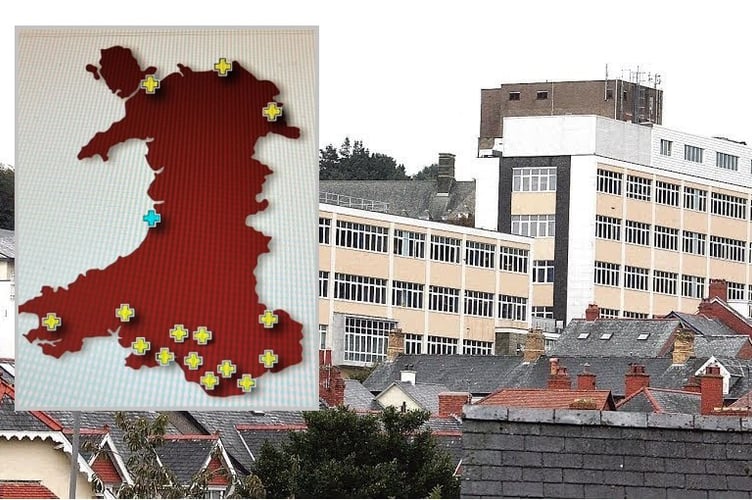
Patients at Withybush needing surgery would be transported to Glangwili for their operation, before returning to Withybush when fit to do so to recover. Emergency general surgery consultant surgeons would be based at Bronglais, and at either Glangwili or Withybush on alternate weeks to provide surgical operations.
There is an additional need with this option for surgical cover to remain at Glangwili for children and young people (paediatrics) on weeks when the service is operating in Withybush.
The plan includes turning Bronglais’ stroke unit into a ‘Treat and Transfer’ Unit, a move that has been greeted with uproar by local politicians and residents and led to the formation of a residents’ group in a bid to put pressure on the health board to retain services at the Aberystwyth hospital.
The stroke unit plans led to more than 400 people gathering at Aberystwyth’s Great Hall on Friday, 20 June, where they were joined by campaigners and politicians from all the major parties apart from Labour.
Ceredigion MS Elin Jones addressed the packed hall and spoke of the campaign to protect services at Bronglais for the last 20 years.
She said: “Some of you like me were out on the streets and the Senedd in 2005 when the proposal at the time for Bronglais was to downgrade A&E, emergency and maternity services.
“A long drawn out campaign followed leading ultimately to the Marcus Longley report.
“That moment felt like a line in the sand.
“A final recognition by government that an area the size of the Bronglais catchment needed a fully functioning district general hospital, planned for strategically by all three mid Wales health boards and that a hospital functioning in that way needed a particular breadth of services to attract the full compliment of staff and expertise and properly serve the local population.
“And crucially it needed to be modelled in such a way that recognised that numbers coming through the door of a rural hospital are always lower than an urban area and services needed to be designed in a more bespoke way.
“A one size fits all is not equivalent to one size suits all.
“The highly engaged and innovative staff at Bronglais have been designing those bespoke services since then.
“The stroke service at Bronglais has been particularly innovative and now all that recent progress is in jeopardy.”
Ms Jones went on to describe the treat and transfer model as being full of risk, adding: “It’s the transfer element that fills us full of dread.
“There is no detail in the consultation about transfer of stroke patients
“Without it, there is no hope that the health board can persuade this community to trust a treat and transfer model and it’s not fair for you to ask us to do so.
“All experience and evidence is that a transfer model treats us as second class citizens.”
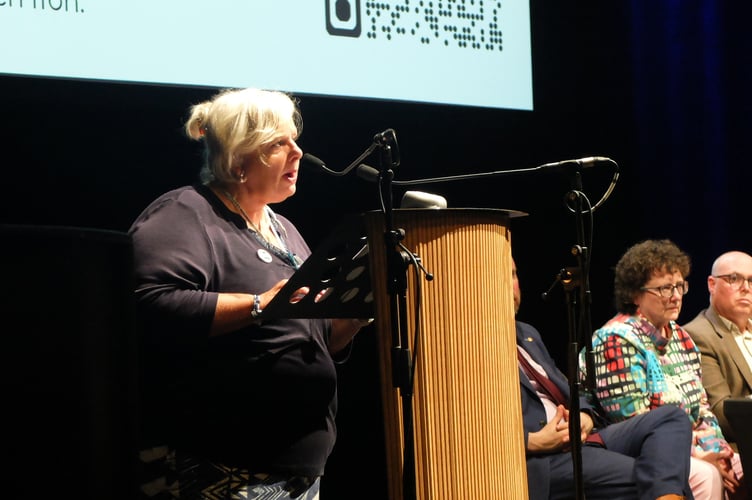
Carmarthen West and South Pembrokeshire MS, Sam Kurtz, also addressed the meeting and spoke of a breakdown in trust between local communities and the health board.
Speaking to the Aberystwyth crowd, he said: “We heard that the consultation is that we are open to listening and open to changing the consultation documents.
“I’ve met with the health board and Paul (Preseli MS) both said we’ve heard it all before.
“And that is where that breakdown in trust comes between the community the health board and those that work within the health board.
“We’ve all got personal experience.
“I remember my father being in the intensive care unit at Withybush.
“The quality of care he received from those fantastic dedicated staff. But we had to take him there in our own car because no ambulance was available.
“Two weeks in intensive care, a 40 per cent survival rate. Thank god we bundled him into a car to get him in because had we waited for an ambulance, my father would not be here now.
“How can we trust the transportation links.
“Assurances are not enough when communities do not trust the health board and this direction.
“I am really frustrated because we should be immensely proud of the health board we’ve got, of the hospitals we’ve got and the staff that work within it.
“But there’s this breakdown of that relationship that needs to be rebuilt.
“I thank the health board for fronting up this evening, but this meeting alone is just one part of it.
“This isn’t over but at the same time why has it been allowed to begin?”
Fellow Conservative MS for Preseli Paul Davies said: “The health board tell us that these services are fragile and I accept that staff have to work in very difficult circumstances and we appreciate everything they do.
“But if we had seen better planning and appropriate investment then perhaps these services would face these pressures in the first place.
“Let’s be clear, delivering health services in rural areas like this is different to delivering health services in urban areas and that’s why I’ve always advocated for a rural premium when it comes to delivering health services.
“The Welsh Government should accept that delivering health services in rural areas is different and that’s why we need to see an appropriate planning framework which recognises that patient services is based on a geographical spread, not just determined by population.
“I’m pleased that there is a lot of cross party consensus to oppose these proposals and fight against the centralisation of services.
“And I am pleased the health board senior management area here to listen, but it’s all well and good listening but what we now need to see is action.”
Speaking following the Great Hall meeting at which he spoke, Montgomeryshire MS Russell George said: “The geography of our region means long, stressful journeys for families at a time of crisis. A round trip from towns such as Llanidloes or Machynlleth to travel to Llanelli would take a family member four hours or more to visit a loved one.
‘’We should be investing in Bronglais, not downgrading its services. Former clinicians have rightly said these plans are unworkable and dangerous. The health board must listen to the clear and united voice from mid Wales.
‘’My thanks go to the Protect Bronglais Services campaign team for their tireless efforts in raising awareness and mobilising the community.
‘’It was clear that all present at the public meeting gave a clear view to the Health Board to listen to the voices of mid Wales and to ensure that the vital Stroke Unit remains and isn’t downgraded.’’
Hywel Dda Chief Executive, Dr Phil Kloer, told the crowd at the meeting: “We are open to new ideas but there are some real dilemmas that we face.
“Some people have come here with the impression that Bronglais is under threat. It is not.
“It is a vital provider of healthcare services for mid Wales. We all know that.”
Chair of the health board, Dr Neil Wooding added: “This is a proposal that has been driven by clinicians and I trust our clinicians.
“The question for me is how do we create a solutionable way forward that ensures that people are not disadvantaged from those services in the future.
“Our goal is to deliver better services.”
Former Ceredigion MP Mark Williams disputed the claim that clinicians were in favour and demanded to know whether those clinicians were the ones based in Aberystwyth or those in Carmarthenshire.
He added: “Have we seen a proper impact assessment? What is the timetable?
“We’ve heard that the health board are open minded and open to change.
“Might I suggest to you that in addition to the two options, there should have been a third to throw out this ridiculous, dangerous proposal before it is too late.
“And reassure these people that they will be safe in the hands of people like yourselves who build the structures in which staff have to work.”
The consultation was approved at a Hywel Dda board meeting on 29 May after hearing that the planned deficit had now been reduced to £31.55m but conceded that planning a deficit was a “novel and contentious action by not delivering against the board’s statutory duty to financially breakeven across a three-year period.”
A report said: “There has been significant effort in the last quarter to fully identify the £32.4m savings target, with £32.9m being identified, of which £31.5m has been actually delivered on an in-year basis, leaving an under delivery against identified plans of £1.4m, and £0.9m adrift of the savings target set within the annual plan.
“Whilst savings delivery is an improving trend, of the £31.5m delivery projection, there is a recurrent savings shortfall of £14.3m, resulting in the underlying deficit significantly exceeding the 2024/25 outturn of £24.1m.”
The underlying deficit, however, remains above £50m coming into the 2025/26 financial year.
The longer term plan remains to balance the books by 2027/28 through a series of savings, with further plans likely to come forward over the next two to three years.
A report for the meeting on 29 May said that the health board retains its “commitment to establishing a clear route map to in-year financial balance by 2027/28, and has “the intention to develop plans to improve upon this position in quarter two, aiming for a position which is below £30m.”
Judith Paget, Director General Health and Social Services at NHS Wales, in a letter to Hywel Dda Chief Executive Phil Kloer said that while she “understands and recognises the challenging financial position of the health board, the current position is not supportable.”
Mr Kloer said the health board is “fully committed to eroding our financial deficit and agree that continuing our improvement trajectory is of paramount importance for 2025/26.”
In March, Health Secretary Jeremy Miles confirmed that Hywel Dda will be de-escalated from level four to level three for Welsh Government intervention on its improved leadership, planned care performance and improvements in its children and adolescent mental health services.
However, the health board remained at escalation level four for the emergency care performance and finance and planning, meaning a high level of NHS Executive and Welsh Government intervention in those areas.
The consultation on service changes launched on 2 June and will run until 31 August.
The Health Board said it “will consider what they have heard in consultation, as well as supporting evidence and data.”
The results of the consultation are due to be discussed at the Health Board meeting in November.

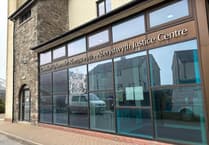
-with-her-son-Rufus-her-partner-and-younger-son-Noah.jpeg?width=209&height=140&crop=209:145,smart&quality=75)
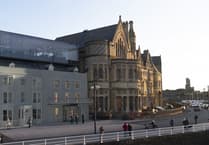

Comments
This article has no comments yet. Be the first to leave a comment.